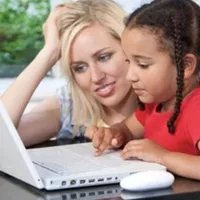97.Home schooling - Teacher's View
Sarah talks about the advantages and disadvantages of home schooling children.
Peter: So sthinking about your future, would you have your kids home-schooled, would you home-school themselves or do you think that it's better for them to go to a normal school, what would you do?
Sarah: I used to say that I didn't know. But then I got my undergrad degree and elementary education and I had a chance to teach in public school. And that's when I decided, yes, absolutely, I would home-school my own children.
Peter: What was the main reason coming to that decision?
Sarah: The main reason was the wasted time that I saw. And also there were so many children in one classroom. It was really hard to get them all to focus and pay attention at the same time, it's nearly impossible. So if I could provide my child with one-on-one attention, I feel like they would learn more, there'd be less wasted time.
Peter: Right. So home-schooling helps with using time productively I guess?
Sarah: I would say so, yes.
Peter: Right.
Sarah: And now that I have the degree as well and elementary education I feel like I'm equipped to be able to do it if I needed to.
Peter: Right. Do you think there are any disadvantages to home-schooling?
Sarah: Probably the number one disadvantage that most people see with home-schooling is the social aspect. And this can be a big deal. It can be very hard, especially with sports, if your child wants to play on a sports team often it's hard to get them in on a team at a regular school. Sometimes there's community groups, but definitely the social aspect is the hardest need to meet with home-schooling.
Peter: For home-schooling, what kind of exams or tests are there to make sure that children pass the grade that they're in?
Sarah: I'm not sure what it's like in all countries, but I know in the US there's ... you take the end-of-year state testing that everyone does, so it's mailed to your house and your parents give you the test and the results are sent back to you.
Peter: Okay. So it's all standardized and everybody goes through the same test?
Sarah: Yes.
Peter: Right.
Sarah: And then when it comes time to take the SAT or the end of high school test then you can actually go and take them at a public school with everyone else, they'll allow you to do that.
Peter: Okay. When you arrived in college did you notice any differences between the education you had and like the education other kids had not having gone through home-schooling?
Sarah: The main difference I saw the social aspect. There are many things sort of culturally almost that I didn't know, that I was sheltered from, just things and sayings and popular things that happen in school that I had no clue about. It's almost a completely different culture than what I was raised in. So that was very different. And also I saw a difference then, it was really hard for me to learn with someone lecturing because I was so used to learning everything out of a book, reading it for myself, and so I'd have to listen and take notes, was a big struggle for me.
Peter: Really?
Sarah: Yes.
Peter: But it sounds like you ended up being quite a self-driven and self-disciplined learner, if you'd gone through the textbooks yourself.
Sarah: Yes; i think you really can't help but be if you are home-schooled, so yeah.
Peter: Right. Thank you very much, it was really interesting.
Sarah: Absolutely.

